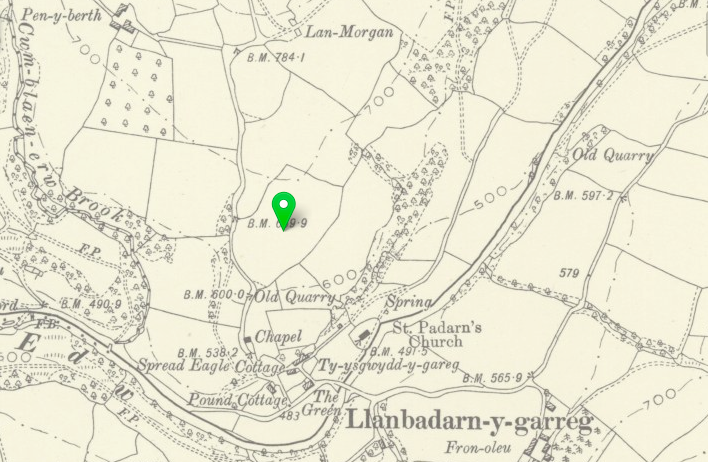Items Named after the Sayce name
Crustacea
The crustacean listed below have been named by or after O.A.Sayce:-
- Heterias pusilla (Sayce, 1900).
- The amphipod Austrogammarus haaseiwas first decribed by Sayce (1901) and redescribed by Williams & Barnard (1988). It is found in freshwater in Victoria, Australia.
- Austrochiltonia subtenuis, syn. Chiltonia subtenuis (Sayce, 1902). A Victorian freshwater Amphipodia.[4]

- Pseudomoera Fontana (Sayce, 1902) are found in freshwater streams in south-eastern Australia. [1]
- The genus Branchinella (Sayce, 1903) is one of the most speciose genera of fairy shrimps in the world with 33 species so far described (Belk & Brtek, 1995). These shrimps are endemic to Australia.
- Koonunga cursor (Sayce, 1908) are found in freshwater in Victoria and South Australia. [1]
Place Names
Cae Sayce and Gwynne, a name of an arable field name in the Parish of Llanbadam-y-garreg, Radnorshire c.1841.{5}

Catty Sayce, a field in the Parish of Goodrich, Herefordshire. Apportioned 1841.[6]
Close Sayce, a field in the Parish of Norton, Radnorshire. Recorder 1841.[7]

Cwm Sayce, name of a field meaning “Saxon / English valley” near the Parish of Bacton, iHerefordshire. Apportioned in 1839.[3][6]
Cwm Sayce and Lodge Wood, name of a field near the Parish of Bacton, iHerefordshire. Apportioned in 1839.[6]
Dunchers Meadow or Sayces Bank, name of a field in the Parish of Titley, Herefordshire. Apportioned 1842.[6]
Little Cwm Sayce and Lodge Wood, name of a field near the Parish of Bacton, Herefordshire. Apportioned in 1839.[6]
Pool Sayce, a field in the Parish of Llangarren, Herefordshire. Apportioned 1839.[6]
Sayce Glacier, Antarctica. Located at 650500S & 060500W. Glacier flows SW into the head of Flandres Bay, Danco Coast, immediately N of Pelletan Point, on the W coast of Graham Land. Charted by the Belgian Antarctic Expidition under Gerlache, 1897-99. Was photographed form the air by FIDASE, 1956-57. Named by the UK Antarctic Place-names Committee (UK-APC) in 1960 for Benjamin Jones Sayce (1837-1895), English photographer who, with W.B. Bolton, invented the collodion emulsion process of dry plate photography, which displaced wet collodion in 1864.[2]

Sayce Island, Royal Botanical Gardens, South Yarra, Melbourne, Australia. Named after Joseph Sayce, who designed Government House and its gardens circa 1874. The Fountain Court, formal terraces, carriage drive, main lawn and encircling path that remain today are part of Joseph Sayce’s original plan. William Guilfoyle, Director of the Botanic Gardens, refined and helped implement Sayce’s design. Guilfoyle arranged the gardens as a combination of clumps of shrubbery and broad sweeping lawns so that ‘at every step the visitor finds some new view’.

Sayce Lane, Hawthorn, Melbourne, Australia. No history is known but it is highly possible that it might have been a night cart lane in early Melbourne.

Sayce Place, Florey, Canberra, Australia

Sayce Square, Wingthrop, West Australia, 6150

Sayces Common, a field in the Parish of Crasswal, Herefordshire. Apportioned 1843.[6]
Sayces Meadow, a field in the Parish of Dilwyn, Herefordshire. Apportioned 1837.[6]
Sayces Plock, a field in the Parish of Kingsland, Herefordshire. Apportioned 1841.[6]
Street Names
Sayce Close, Metford, New South Wales, Australia

Sayce Street, Widnes, Cheshire, England. Named after George Edward Sayce (1825-1860), a Widnes dignitary and Tory councillor.

Small Orchard by Sayce, a field in the Parish of Much Dewchurch, Herefordshire. Apportioned in 1846. [6]
R72 Sayce Logarithmic Test Chart
The R72 Sayce Logarithmic Test Chart is a Resolution Standard used in optical imaging. The chart is ruled with 90 lines and spaces with gradually decreasing width. The lines and spaces are in logarithmic series, and their lengths are varied to assist counting. The Sayce target ranges in frequency from 0.25 cy/mm to 5 cy/mm with peaks every 10 cycles. Overall image area 3.75” x 5”. Substrate : Chrome on glass.
SAYCE GOLD (IRE). A bay mare born 25 April 2013, owned by by Mr Trevor J. Hemmings. Her trainer as at 2021 was Michael Winters, Ireland. Her pedigree is: GOLD WELL - SAYCE (IRE) - SUPREME LEADER. The starting price for SAYCE GOLD (IRE) was 10/3 (Betfair SP5.20).
References
1. www.crustacea.net
2. National Geospatial-Intelligence Agency, Bethesda, MD, USA



